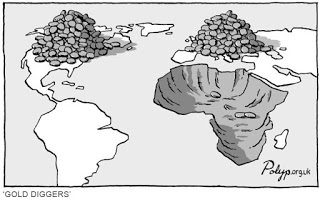A very short paper on a very broad subject, co-written with David Fields, which was presented at the last ASSA Meetings in San Francisco. It is forthcoming in the Review of Radical Political Economics (RRPE). The title is derived from Gunder Frank's ReORIENT, that David and I always thought was thought provoking, but surprisingly Monetarist in its assumptions about money. The paper also adds a discussion of Pomeranz famous views on the Great Divergence, particularly the views regarding technological change, which are marginalist at its core, as well as those of Gunder Frank and some of his critics, like Arrighi.From the abstract: This paper analyzes the revisionist literature on the Rise of the West. Revisionist authors suggest that the so-called Great Divergence is relatively recent, and that good luck – in the form of silver from the Americas, and abundance of coal, rather than European exceptionalism – was central for the higher rates of growth of GDP in the West. This paper argues that while the revisionist literature provides relevant critiques of conventional accounts of the Rise of the West, it remains rooted in marginalist or neoclassical views of both the role of money and technological progress, and that abandoning these theoretical foundations would strengthen some of its arguments.
Topics:
Matias Vernengo considers the following as important: Arrighi, Fiscal-Military State, Great Divergence, Gunder Frank, Pomeranz, Rise of the West
This could be interesting, too:
Matias Vernengo writes From Truncated Developmental State to Failed State in Latin America
Matias Vernengo writes Handbook of the History of Money and Currency
Mike Norman writes Justin Podur — Why It’s So Hard for Most Countries to be Economically Independent from the West
Matias Vernengo writes Classical Political Economics and the History of Central Banks
From the abstract:
As far as I can tell, there aren't many papers in economic history that properly acknowledge the contributions of the revisionist literature, but also of the Military Revolution (Parker), the Consumer Revolution (McKendrick), and the Fiscal-Military State (Brewer). In fact, these historical schools are more compatible with non-marginalist views of the functioning of the economy that emphasize the role of demand and endogenous money in the explanation of the Rise of the West.This paper analyzes the revisionist literature on the Rise of the West. Revisionist authors suggest that the so-called Great Divergence is relatively recent, and that good luck – in the form of silver from the Americas, and abundance of coal, rather than European exceptionalism – was central for the higher rates of growth of GDP in the West. This paper argues that while the revisionist literature provides relevant critiques of conventional accounts of the Rise of the West, it remains rooted in marginalist or neoclassical views of both the role of money and technological progress, and that abandoning these theoretical foundations would strengthen some of its arguments.

